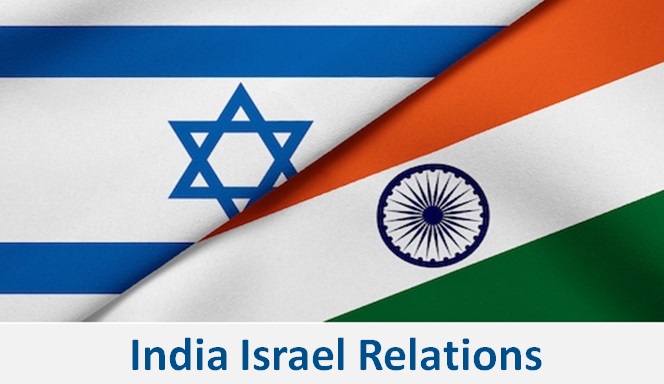India Israel Relations – Strategic Partnership And Defence Relations
India Israel relations recently celebrated the twenty-five years of successful diplomatic relations formally established in 1992. Israel has also emerged as the second largest and trusted supplier of sophisticated defence equipment for the Indian armed forces.
India and Israel had established full diplomatic relations in 1992. Since then there has been a regular exchange of visits by political leaders and the bilateral relations between the two countries have significantly improved at all levels. Both the nations have closely worked together in the field of defence, agriculture, technology, security and space.
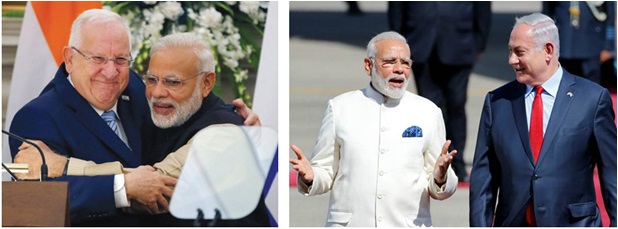
India Israel relations are at its historic peak after the first ever visit by Indian Prime Minister Narendra Modi in 2017 and subsequent visit by Israeli Prime Minister Benjamin Netanyahu to India in 2018. Both the leaders have demonstrated commitment to take the India Israel relations to the next level and rapidly marching towards strategic partnership.
Table Of Contents
- India Israel Relations – Informal Relations
- India Israel Relations – Formal Relations
- India Israel Relations – Defence Relations
- India Prime Minister Narendra Modi’s Visit to Israel 2017
- Israeli Prime Minister Benjamin Natanyahu’s Visit to Indial 2018
India Israel Relations – Informal Relations ( 1950 to 1990 )
India became independent in 1947 after prolonged freedom struggle. Israel proclaimed as an independent nation in 1948 . Both the nations had to face the war just after independence from hostile Islamic countries. The newly formed state of Israel had to face a major challenge and had to struggle for initial recognition after its independence in 1948 .
India after its independence had to face a major armed conflict with Pakistan over the Kashmir issue . Pakistan had attacked India in 1947 to forcibly capture Kashmir when the Hindu king Maharaja Hari Singh decided to accede Kashmir to India. This war is referred as first war of Kashmir .
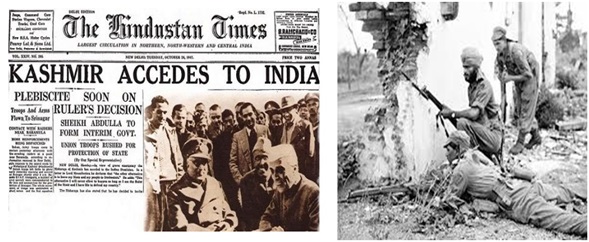
The Indian government led by Prime Minister Jawaharlal Nehru was reluctant to recognise the newly formed state of Israel. The Indian reluctance was mainly due to India’s own sizable Muslim minority population, India’s existing relations with the Arab countries. The India reluctance was also influenced by the prevailing Indian foreign policy which was more aligned with Soviet bloc.
Despite the initial phase of dormant relations, India Israel relations are gradually shaping up as a strategic partnership. There has been a remarkable alignment of strategic and economic interests. Historically, India has always been a safe house for the Jewish community and the Jewish people consider India as a second home.
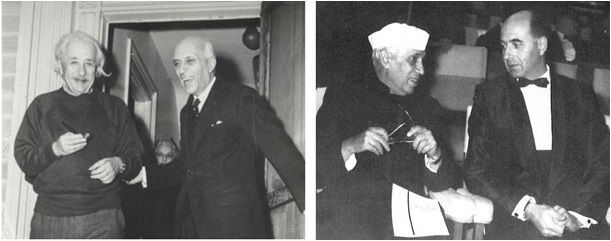
India Israel Relations – Formal Relations ( 1992 Onwards )
The Indian government led by PM Nehru officially recognized the State of Israel On 17 September 1950. The Indian freedom leader Mahatma Gandhi had also in principle approved the formation of the state of Israel but he was not in favour of creation on the religious ground.
The Indian PM Jawaharlal Nehru had clarified after granting formal recognition to the Jewish state in 1950 and said “would have recognized the Jewish state of Israel long back because Israel is now a fact. He further said , India refrained so far because of Indian desire not to offend the sentiments of our friends in the Arab countries”. The Nehru government also subsequently In 1953, permitted Israel to open a consulate in Mumbai.
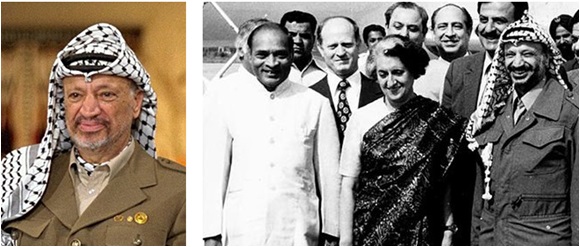
However, the Nehru government had enjoyed close relations with Palestinian leader Yasser Arafat and the Indian government had openly supported the Palestinian cause. And for this reason, India initially refrained from establishing full diplomatic relations with the state of Israel.
Further, The Indian government did not want to spoil the Indian relations with the Arab countries and believed that by permitting Israel to open an embassy in New Delhi might antagonize the local Muslim community and also risk the existing cordial relations with the Arab world.
Since 1950 onwards till 1990 the India Israel relations were in the dormant state primarily due to Arab factor. During this period, sizable Indian workers were employed in the Gulf countries which were an important source for crucial foreign currency and helped India to maintain crucial foreign exchange reserves.
By 1990 the Jewish state of Israel had firmly established its credentials as a military force to reckon despite its small size. The state of Israel had also emerged as a friendly and trusted friend with Indian political leadership. It is also widely believed that the intelligence agencies of both the nations ( RAW and MOSSAD ) were closely working together to counter the common threats.
The Indian government soon realized the need to form an alliance to effectively counter the growing Pakistani influence amongst the Arab countries with the formation of Organization Of Islamic Co-operation ( OIC ) . The OIC failed to recognize and protect the interest of the sizable Indian Muslim community and rather favored Pakistan .

The Indian political party BJP “ Bhartiya Janata Party “ with Nationalist agenda also emerged as a major political force to reckon in the Indian political arena . The BJP was very much in favour of close ties with Israel mainly due to visible convergence of shared strategic interests .
The Indian dilemma ended when India formally established full diplomatic relations with the state of Israel in 1992 and the Indian government opened an embassy in Tel Aviv in Israel .Since then , the bilateral relations between India and Israel have significantly flourished. Both India and Israel have common strategic interests and facing common security threats.
India Israel Defence Relations
The Jewish state of Israel quickly established itself as one of the leading producers of cutting edge defence technology developer. The due credit must be given to the Israel political leadership for vision and creating an eco-system for innovations in the field of science and technology.
Today , Israel Defence Industry has sizable share and emerged as a key driver for the Israel’s economy .Israel’s investment in developing its domestic defence industry has paid rich dividends.
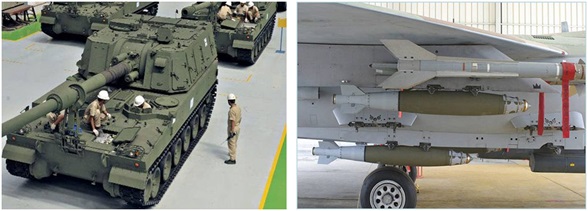
Whereas the Indian government led by Congress party with socialistic policies kept the Indian private sector away from the defence equipment manufacturing. The Indian mega defence purchases also offered a major opportunity for the political parties in India for corrupt practices to raise the money.
The Indian government-owned defence production companies also miserably failed to perform to meet the growing needs of the Indian armed forces. As a result, India today is the largest importer of arms in the world.
After independence 1947 onwards, India was mainly dependent upon the Soviet Union for defence equipment. The Indian foreign policy and the proximity to Soviet bloc kept the US away from the Indian arms market. After the disintegration of soviet union and end of the cold war, constrained the Indian government to look for other alternative sources for weapons.
During this period, India had also started importing major defence equipment from European countries which mainly include the United Kingdom and France. However, the Indian government quest for self-reliance with technology transfer offered a major opportunity for the Israeli defence industry.
By now, Israel had already firmly established itself as a major producer sophisticated defence platforms and also as a trusted friend. Israel also enjoyed admiration and tremendous goodwill amongst Indian people and political leadership. The convergence of strategic interest worked as a catalyst and forced the Indian leadership to open the doors for Israeli defence equipment.
The Israel also gave access to India to some of the most cutting edge defence technology which was significantly better and cheaper as compared to Russian equipments . Israel soon emerged as second largest supplier of defence equipments for India . The Israeli help especially during the India Pakistan Kargil War 1999 played a crucial role for India to score victory against Pakistan .
The disintegration of soviet union had adversely affected the supply-chain and the availability of spare parts for large chunk of soviet era defence equipments . During this period , the Israeli companies worked closely with the Indian defence ministry and offered crucial help, expertise to upgrade the ageing inventory of soviet era defence equipments . The Indian Mig-21 Bison upgrade is an example which recently shot down Pakistani F-16 .
India Israel Defence Relations And Defence Projects
- India Acquired Israeli Falcon AWACS System .
- India Operates Israeli UAV for Reconnaissance Operations.
- Israeli X-95 Assault Rifles
- Sophisticated Radar For Air Defence
- Barak 8 Missile Defence SAM for Indian Navy.
- Joint Development of QR SAM And LR-SAM .
- Laser Designation Pods For Air Force.
- Laser Guided Precision Munitions For Indian Air Force.
- Elbit System – Helmet Mounted And Pointing System For IAF.
- Heron TP Armed Drone Vehicles
- IUHDSS – Integrated Under Water Harbor Defense & Surveillance System
- Spike Anti-tank Guided Missiles
- SPYDER Air Defence System
- CIBMS – Comprehensive Integrated Border Management System
- Surface To Surface BVR Durbey Missiles For LCA Tejas.

Indian Prime Minister Narendra Modi’s Visit To Israel – 2017
The Modi government came to power in India in 2014 with a decisive mandate under the dynamic nationalist leader Narendra Modi. The newly elected Prime Minister of India Narendra Modi became the first Indian leader to visit Israel on July 4, 2017.
This historic visit witnessed the superb chemistry and the mutual admiration and comfort level between the two leaders. The Israeli Prime Minister Netanyahu gave a very special warm welcome And his Indian counterpart and personally accompanied him throughout his three-day visit.
During the Indian PM visit both the countries reiterated the significance and the commitment to take the India Israel relations to the next level. This visit also marked by a number of collaborative deals, cooperation agreements signed between the two countries in the field of technology, Agriculture, space and other fields. The Indian Prime Minister did not visit Palestine nor met any Palestinian leader during this visit which was indicative of significant departure from traditional Indian stand.
Israeli Prime Minister Benjamin Netanyahu’s Visit To India – 2018
The Israeli PM Benjamin Netanyahu visited India on 14th January 2018. His visit is followed by Indian PM’s visit to Israel in 2017, Before his departure to India, Prime Minister Netanyahu commented about his visit :
“This evening I am leaving on a historic visit to India. I will meet with the Prime Minister, my friend Narendra Modi, with the Indian President and with many other leaders. We will sign very many agreements. We are strengthening ties between Israel and this important global power. This serves our security, economic, trade and tourism interests, as well as many other areas. This is a great blessing for the State of Israel.”
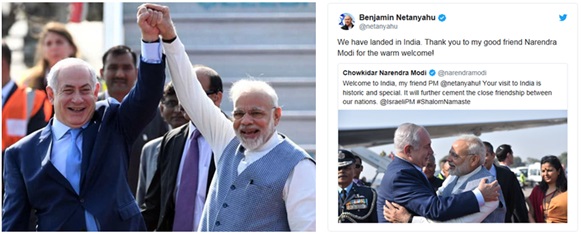
The Indian PM Narendra Modi extended a warm welcome to his friend and personally went to receive him at the airport . This was a very significant visit by Israeli PM in the last decade. He was accompanied by a large Israeli delegation of over 130 members which also includes top Israeli Industry leaders.
In order to promote the India Israeli trade, The Israeli PM also met with the Indo-Israeli CEO forum in New Delhi. He also addressed a separate business event and also visited Ahmedabad, Mumbai and Agra. Mr Netanyahu also met Indian President Ram Nath Kovind in the Presidential palace.
Watch India Israel Relations
Indian Government Stand On Recent Israel Hamas Conflict 2023
Conclusion
Both India and Israel enjoy mutually rewarding bilateral and defence ties over the period last 25 years. Israel has consistently demonstrated its crucial support during various armed conflicts with hostile Indian neighbours.
The convergence of strategic, economic interests and the commitment to democratic values has helped both the nations to build a mutually beneficial relations.
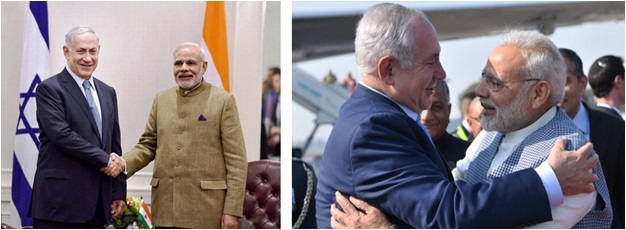
The India Israel relations also shaping as a strategic partnership in 2019 . Israeli Prime Minister Benjamin Natanyahu has once again back in office after his re-election in recently concluded elections 2019 .
The Indian Prime Minister is heading for his historic win and soon expected to be back in office for his second term . Both these leaders are committed to take the India Israel relations to its new pinnacle.
